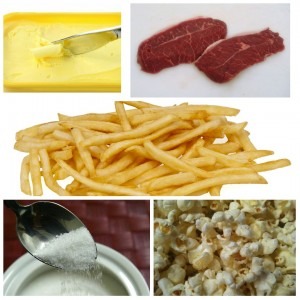5 cancer causing foods in your kitchen
March 15, 2016 | Author: Shalini Sahni
According to the American Cancer Society, about 1,685,210 new cancer cases are expected to be diagnosed in 2016. Believe it or not, one of the major threats that put us at the risk of deadly cancer is food. Every day we buy and consume a lot of food products that are harmful or even deadly. Scary isn’t it? Check out these five cancer-causing food items that may be present in your kitchen:
1. Processed Meat and Red Meat
The International Agency for Research on Cancer identifies processed meat (hot dogs, ham, bacon, sausage) as a definite carcinogen and red meat (beef, pork, lamb, goat) as a probable carcinogen. Meat processing can lead to the production of cancer-causing chemicals such as N-nitroso-compounds (NOC) and polycyclic aromatic hydrocarbons (PAH). Red meat contains heme iron which breaks down to form NOC that damage the cells in the bowel. High-temperature cooking of meat (e.g., pan-frying, grilling, barbecuing) – can also form carcinogenic chemicals, including heterocyclic aromatic amines (HAA) and polycyclic aromatic hydrocarbons (PAH). The experts at IARC inferred that each 50 gram portion of processed meat eaten daily increases the risk of colorectal cancer by 18%. The best way to prevent this is to eat white meat or reduce consumption of red meat and processed meat.
2. Hydrogenated Oils
Hydrogenation of oils is a process that converts liquid oils to a solid or semi-solid state, such as margarine. A study conducted by the French Institute of Health and Medical Research discovered that eating a lot of trans fats (present in hydrogenated oils) may increase the risk of breast cancer. Trans fats are also known to cause heart diseases and immune system problems. These risks can be avoided by choosing coconut oil, olive oil or organic butter as suggested by Dr. David Brownstein, of Newsmax.
3. Refined sugar and refined flour
A meta analysis shows that foods with high glycemic index values, such as refined sugar and flour, accelerate the growth of cancer cells and tumors in the human body. When we consume white sugar or white flour, the pancreatic cells release insulin and IGF (Insulin-like growth factor) which allow glucose to enter the cells and trigger cell growth. The high levels of insulin and IGF in the body promote the growth of cancer cells and stimulate their capacity to invade surrounding tissues. Substituting refined sugars with natural sugar substitutes such as stevia and substituting whole grains for white flour can help to keep insulin levels in check and promote cancer survivorship.
4. Potato chips and French Fries
Researchers in Europe and the United States discovered carcinogenic acrylamides in certain foods that were heated to a temperature above 120 degrees Celsius (248 degrees Fahrenheit). Acrylamide is a chemical used in many industrial processes such as the production of paper, dyes, and plastics. Potato chips and French fries were found to contain higher levels of acrylamide compared with other foods and hence promote higher risk for several types of cancer. To prevent consumption of acrylamide, it is highly recommended to avoid fried foods.
5. Microwave popcorn
Microwaving in general can suppress immunity and contribute to cancer. As regards microwaving popcorn, the lining of most microwave popcorn bags has a chemical called perfluorooctanoic acid (PFOA), which is also used in making Teflon and other stain-and stick-resistant materials. Studies suggest PFOA can cause thyroid issues, high cholesterol and bladder cancer. To avoid potential hazards of microwave popcorn, Dr. Andrew Weil, M.D., recommends air popping the kernels and flavoring them with spices or cheese. [Editor’s Note: We recommend you don’t microwave anything, make sure your popcorn is non-GMO, and leave off the cheese — another cancer promoter.] It may seem difficult to exclude our favorite foods from our diet but there are a lot of healthy alternatives available which can lower the risk of cancer. Awareness and healthier food choices are the keys for a cancer-free life.
Join the conversation: Ask Holistic Cancer Coach Facebook Group
References:
[1] http://www.cancer.org/research/cancerfactsstatis “http://www.cancer.org/research/cancerfactsstatistics/cancerfactsfigures2016/” “http://www.cancer.org/research/cancerfactsstatistics/cancerfactsfigures2016/”tics/cancerfactsfigures2016/
[2] https://www.iarc.fr/en/media-centre/pr/2015/pdfs/pr240_E.pdf
[3] http://www.who.i “http://www.who.int/features/qa/cancer-red-meat/en/” “http://www.who.int/features/qa/cancer-red-meat/en/” HYPERLINK “http://www.who.int/features/qa/cancer-red-meat/en/“nt/features/qa/cancer-red-meat/en/
[4] https://academic.oup.com/aje/article/167/11/1312/132229
[5] http://www.newsmax.com/health/Dr-Brownstein/omega-fat-oil-hydrogenated/2014/12/23/id/614699/
[6] http://www.ncbi.nlm.nih.gov/pubmed/23167978
[7] http://cancerres.aacrjournals.org/content/58/15/3243.long
[8] http://www.ncbi.nlm.nih.gov/pubmed/12368845
[9] http://www.cancer.org/cancer/cancercauses/othercarcinogens/athome/acrylamide
[10] https://academic.oup.com/toxsci/article/99/2/366/1679065
[11] http://www.drweil.com/drw/u/QAA400701/Microwave-Popcorn-Threat.html
